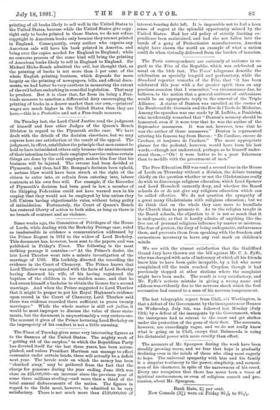On Timsday last, the Lord Chief Justice read the judgment
of ' himself and four other Judges of the Queen's Bench Division in regard to the Plymouth strike case. We have dealt with the details of the decision elsewhere, but we may express here our satisfaction at the result of the appeal. The judgment, in effect, establishes the principle that men cannot be held to have intimidated others only because the announcement of their intention to leave their employer's service unless certain things are done by the said employer, makes him fear that his business will be injured. The reverse had been decided at Plymouth ; and thus, had Mr. Bompas's decision been upheld, a serious blow would have been struck at the right of the citizen to enter into, or refrain from entering into, labour contracts at his own free will. For example, if the Recorder of Plymouth's decision had been good in law, a member of the Shipping Federation could not have warned men in his employ that they would not be employed by him unless they left Unions having objectionable rules, without being guilty of intimidation. Fortunately, the Court of Queen's Bench has restored liberty of action to both sides, as long as there is nobreaoh of conkract and no violence.


















































 Previous page
Previous page